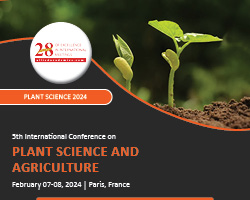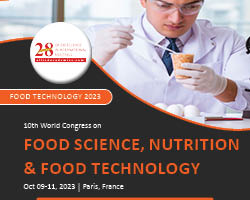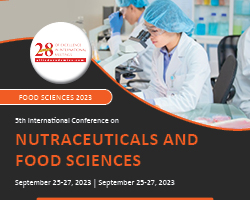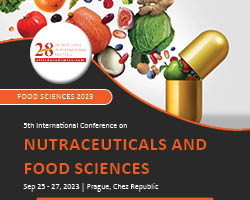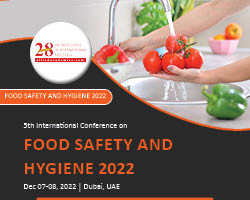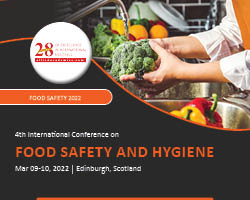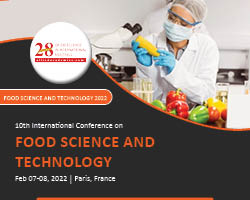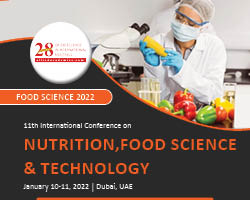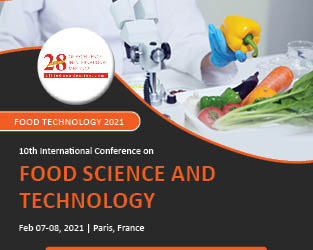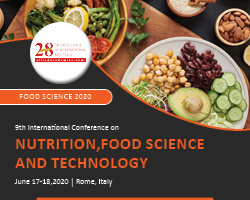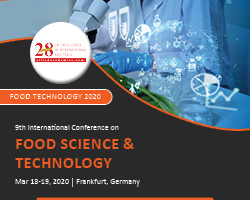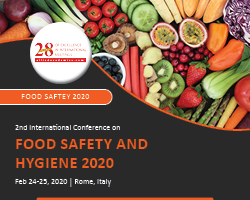2024 Conferences
2023 Conferences
2022 Conferences
2021 Conferences
2020 Conferences
Meet the Global Inspiring Experts and Speakers at Allied Academies Conferences totalk about new advancements & innovations in the field of Agriculture,Aquaculture and Food Technology. This academic occasion is to revitalizethe enduring connections and flash with new peers around the globe. Our InternationalConferences platform is not just to make a phase for exchange of information’s,but also endeavor to spread focused and research advances in various fields ofAgriculture,Aquaculture and Food Technology.
Agriculture Conferences: Agriculture has been the source of livelihood for millions of people in the world and has been the basic source of food for mankind. So every investment and effort in the field strives to feed the unfed and hungry. Various advancements and innovations in the field have helped provide farmers with tools and resources to make agriculture more sustainable. Hence, new technologies have given rise to innovations like Soil and Water Sensors, Weather Tracking, Satellite Imaging, Pervasive Automation, Minichromosomal Technology, RFID Technology, Vertical Farming, etc.
Aquaculture Conferences: Aquaculture has a prominent role in eradicatinghunger and poverty in many developing countries including sub-Saharan Africa.Aquaculture has a major contribution to food security in many parts of theworld. There are around 840 million people who lack adequate Food access andthe population growth would be resulting the more food insecurity leads to theFood scarcity to lead a normal healthy lifestyle. Aquaculture leads can meetthis food insecurity with its abundant protein, essential micronutrients andcan potentially eradicate human diseases.
The Aqua Conferenceis to evolve the techniques in the aquaculture field and to truncate theimpediment in the process of culture. The predominant purpose of the conferenceis to establish germane research and development in the aquaculture field. Jointhe conference to manifest about the aqua farming.
Food Technology isa train of sustenance science. All the more fittingly it is a multidisciplinarysubject including food engineering, foodmanufacturing, food processing, food packagingand foodpreservation. The food technologists think about the substance,physical and microbiological cosmetics of the nourishment. The sustenanceinnovation gathering try to meet the huge names far and wide to come down to atypical place, share a typical platform and broaden their insight among futurescientists, business visionaries and additionally the ranchers who dedicatetheir work and time to give nourishment to the whole world. Nourishment meetingadditionally gives a premium interdisciplinary stage to develop a system fromthe grass root to the apical best among the general population associated tosustenance science.
Complying with theneed of the hour, Allied Academies’international conferences provide the perfect forum for researchers from allover the world to meet, network and discuss the most critical issues and cuttingedge solutions in Agriculture, Aquacultureand Food technologies. Each conference is an amalgamation ofconventional and contemporary technologies, designed to speculate novelmethodologies and techniques for the betterment of humanity.
Water, fats, proteins, and carbs make up the majority of food. Food also contains minerals (such as salts) and organic compounds (such as vitamins). Photosynthesis is used by plants, algae, and some microbes to produce their own food molecules. Water is contained in many cuisines and has been classified as a food in its own right.
Agriculture is both an art and a science that involves nurturing the land, growing crops, and rearing livestock. It entails the preparation of plant and animal goods for human consumption as well as their delivery to markets. Agriculture produces the majority of the world's food and textiles. Organic food is necessary for the maintenance of diet and nutritional growth in our lives in order to remain healthy Lifestyle.
Aquaculture is the farming of fish, crustaceans, mollusks, aquatic plants, algae, and other creatures. Aquaculture is the growing, breeding, and harvesting of aquatic species (including animals and plants) in controlled aquatic habitats such as oceans, lakes, rivers, ponds, and streams. It is used for a variety of objectives, including food production, the restoration of vulnerable and endangered animal populations, the improvement of wild stock populations, the construction of aquariums, fish cultures, and habitat restoration.
Aquaculture includes the cultivation of freshwater and saltwater populations under lab conditions, as opposed to commercial fishing, which entails the capture of wild fish. Aquaculture done in maritime areas and underwater habitats is referred to as marine resources."
Current research trends:
Food and Agriculture:
Recent agricultural trends have seen an increase in organic agriculture, vertical farming, and intensive agriculture to meet the demands of a growing global population while also addressing growing environmental concerns.
Food consumption has increased globally as a result of increases in population, prosperity, and urbanisation. Food demand has increased globally as a result of increases in population, prosperity, and urbanisation, as well as a shift in dietary choices toward more resource-intensive foods.
Aquaculture:
Trends in aquaculture productivity and environmental performance have been good during the last 20 years. Global aquaculture production comprises 80 million tonnes of farmed food fish, White leg shrimp and cupped oysters are key contributors to shellfish production. Asia accounts for more than 85 percent of global aquaculture output, with China, India, Indonesia, Vietnam, and Bangladesh among the biggest producers. Globally, a growth in the availability of farmed fish genetic expertise and technical advancements in aquaculture production systems are projected to contribute to the advancement of aquaculture.
Scope and Importance:
Food:
Food has become a high-profit business due to the possibilities for value addition it offers, particularly since the food processing industry has been identified as a high-priority Professionals and play a huge role in the food industry as well as in various R&D Areas.
To achieve the expected returns on investment through good quality and appropriate value addition, the use of technology has become critical, resulting in an unprecedented demand for scientists, technologists, and other professionals who can effectively manage the emerging challenges of the food processing industry.
In a nutshell, "there is a significant need for Food Technology workers in India and internationally."
Aquaculture:
Aquaculture is the world's fastest expanding food supply sector, it contributes to food security and it will play a critical role in feeding a planet with an ever-increasing population. The overall aquaculture production in the globe achieved an all-time high of 114.5 million tonnes in live weight in 2018.
The entire projected first-sale value of this volume of farmed aquatic species is $263 billion in US dollars (US$). Initially-sale value refers to how much a fish or shellfish is worth when it is first collected and before it is processed and packaged for us to eat.
Aquaculture is frequently the major source of many aquatic species we like eating, such as Atlantic salmon, sea bass, and warm water prawns. Aquaculture will provide 62 percent of all seafood produced and destined for our dinner tables by 2030.
Agriculture:
The agriculture sector serves as a barrier to food security and, by extension, national security Agriculture is crucial to the overall health of an economy. Agriculture is the backbone of a country's economic structure. In addition to producing food and raw materials, employs a sizable portion of the population.
Agriculture's significance; Agriculture is one of humankind's oldest vocations. People have been involved in this vocation from the dawn of time. Agriculture is defined as "the skill of nurturing the land." It cultivates the soil, protects the plants, and grows food. Agriculture also encompasses fishing, livestock raising, and forestry.
Agriculture Conference | Agriculture Conferences | Biotechnology Conference | Crop Sciences Conference | Aquaculture Conference | Agronomy Conference | Food economics Conference | Nutrition Conference | Horticulture Conference | Dairy farming Conference | Animal husbandry Conference | Agriculture Congress | Agriculture Events | Agriculture Meetings
Different types of farming are:
- Intensive farming
- Subsistence farming
- Commercial farming
- Mixed farming
- Horticultural farming.
Market Analysis:
Food and Agri:
The global food and beverage sector is expected to increase at a 9.7 percent compound annual growth rate (CAGR) from $5,817.4 billion in 2021 to $6,383.49 billion in 2022. The food and beverage business is expected to grow at a CAGR of 8.7 percent to $8,905.5 billion by 2026.
By 2021, the smart agricultural industry in the United States is anticipated to be worth $3.5 billion. Currently, the country controls 33.56 percent of the global market. China, the world's second largest economy, is estimated to reach a market size of US$1.7 billion in 2026, growing at a CAGR of 12.6 percent throughout the study period. Germany is expected to develop at an 8.3 percent CAGR within Europe, while the rest of the European market (as defined in the study) would reach US$1.9 billion by the conclusion of the analysis period.
Aquaculture:
The worldwide Brackish Water segment will be led by the United States, Canada, Japan, China, and Europe, with a 3.5 percent CAGR. These regional markets, which had a combined market value of US$21.9 billion in 2020, are expected to grow to US$27.9 billion by the end of the research period. China will continue to be one of the fastest expanding markets in this cluster of regional markets. The Asia-Pacific market, led by nations such as Australia, India, and South Korea, is expected to reach $24.4 billion by 2027.
